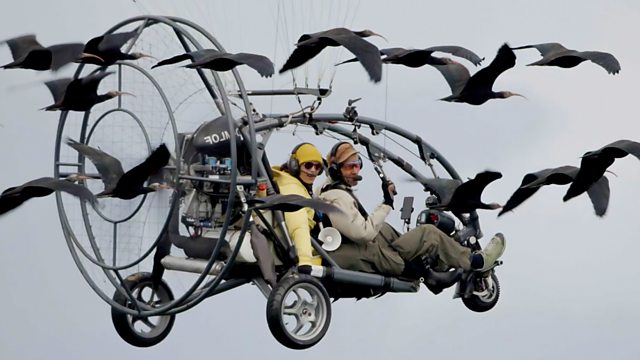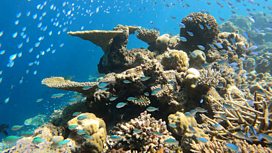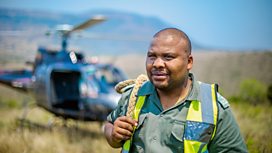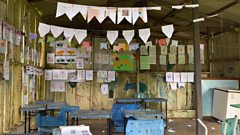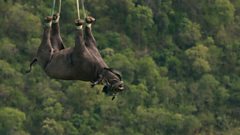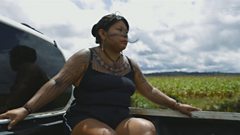Heroes
Sir David Attenborough introduces conservation heroes fighting to save the world’s wildlife, from exploring remote jungles to going undercover to catch criminals in the illegal ivory trade.
All around the world, there are heroes on the frontline of conservation who are risking everything in the fight to save wildlife. Sir David Attenborough introduces this programme saying, ‘A new generation of remarkable people are stepping up to save wildlife. They’re overcoming huge obstacles, travelling to dangerous places and sometimes even risking their lives. To me, they are true heroes! This is the story of some of them.’
In South Africa, Dumisane Zwane is part of a team saving black rhino – a species poached for its horn. To help save them, they are setting up new breeding populations in safe havens. The only problem is how to move rhinos that live in dense and remote areas. Dumi’s ingenious solution is to safely sedate them and put them in a sling under a helicopter – and soon the one-tonne rhinos are flying to their new home.
In Ecuador, Jaime Culebras is devoting his life to saving his beloved frogs. ‘I fell in love with them when I was just seven years old,’ he says. ‘How can you not love them – they are so beautiful.’ But now frogs are the most threatened group of animals, principally due to a fungal disease that is decimating them all over the world.
His favourite frog of all is sad Santiago – perhaps the rarest frog on the planet. He is one of the very last of the Morona-Santiago harlequin frogs. Santiago is kept in captivity in a secure laboratory in the Andes. Jaime wants to find a partner for him so he can set up a captive breeding colony and try and save his species. To do it, Jaime must trek to a remote cloud forest high in the Andes and spend every night exploring the remote mountain rivers for a mate for Santiago.
In Cote d’Ivoire in West Africa, Trang Nguyen is working undercover to catch criminals trading in illegal ivory. Forest elephants have declined by two-thirds in the last 20 years – and this trade is a major cause. Working with a group of local activists, Trang pretends to be a Vietnamese buyer of ivory. Just as the deal is done, she gives a secret signal, and the police swoop in. It’s dangerous work, and hidden cameras tell the story.
Northern bald ibis are amongst the rarest birds in the world. They were hunted to extinction in Europe over 300 years ago. Now there’s a daring plan to bring them back. In Austria, Katharina Huchler is taking eggs from a zoo and rearing the chicks so they believe she is their mother. She is with them all day every day, feeding them and talking to them. It is a process called imprinting – so that the young birds will follow her everywhere. There’s an important reason for all this, as these are migratory birds. To survive, they must fly south in the autumn over the perilous Austrian Alps to the warm feeding grounds of Italy. Normally, they would follow the natural mothers – but now Katharina must show them the way. She uses a microlight to teach her young birds to fly to safety – but will they follow her over the mountains?
To save species from extinction, one must first save the habitats where they live, and increasingly our wild places are disappearing. This is seen most clearly in the Amazon Rainforest – the most diverse terrestrial habitat on the planet.
Alessandra Korap is a leader of the Munduruku, an indigenous group from the Amazon. Its future is now under threat, as the government discusses new laws to open it up to mining and agriculture. To try and save her ancestral home, Alessandra and other indigenous community leaders are organising the biggest ever demonstration by indigenous people in Brazil to make their voices heard. ‘I see us as little ants,’ she says, ‘when we get together – then we start to bother them.’
But saving habitats will not succeed unless we get to grips with the biggest potential threat of all: our changing climate. Mohamed Nasheed is a former president of the Maldives. He attends every climate conference, trying to persuade fellow politicians and leaders to take action. We follow him to COP26 in Glasgow where he says, ‘If we cannot have a legally binding agreement, where countries agree not to push global temperatures above one point five degrees, my country will be gone, as will all the world’s coral reefs and most of the rainforests.’ As climate targets look more and more likely to be missed, Nasheed believes there is a solution. ‘The more the environment becomes an election issue, the more there will be action on climate. Every time you vote – in every election – please tick the planet.’
Last on
More episodes
Previous
![]()
C�������� quiz: Heroes
How closely were you watching the Heroes episode?
![]()
In pictures: Heroes
Take a sneak peak at what's in store for the final episode of Planet Earth III
Clips
-
![]()
Transporting a rhino by helicopter in South Africa
Duration: 01:35
-
![]()
An illegal ivory sting operation in Cote d'Ivoire, West Africa
Duration: 02:37
-
![]()
Protesting to save their ancestral home
Duration: 03:36
Credits
| Role | Contributor |
|---|---|
| Presenter | David Attenborough |
| Production Manager | Bronwen Thomas |
| Executive Producer | Michael Gunton |
| Series Producer | Matt Brandon |
| Series Producer | Jonny Keeling |
| Producer | Steve Greenwood |
Broadcasts
- Sun 10 Dec 2023 18:20
- Sun 17 Dec 2023 17:35�������� One except Scotland, Scotland HD, Wales & Wales HD
- Tue 30 Jan 2024 07:50
Explore AR animals and their habitats in ‘Habitat Explorer’ or order a poster ‘Our Changing World’ to make origami animals!
Visit The Open University website to learn about fascinating animals in their habitats
